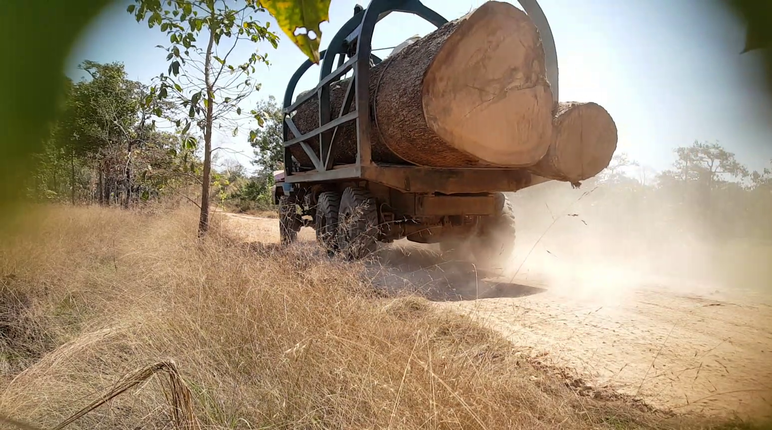An EU seal for illegal timber from Vietnam? NO!
 Trucks smuggle illegal timber out of Cambodia. (© CHRTF)
Trucks smuggle illegal timber out of Cambodia. (© CHRTF)
Illegal timber from Southeast Asia – laundered with an EU seal of approval? That could soon become reality. The EU is preparing a trade deal on tropical timber with Vietnam, a hotbed of timber trafficking. Tell the EU that Vietnam does not deserve a trade agreement until it has cleaned up its act.
Call to actionTo: the European Commission and the governments of the Member States
“The EU must not conclude a trade agreement with Vietnam as long as Vietnamese traffickers are laundering illegal timber from Cambodia.”
The timber smugglers are not overly worried when their trucks, loaded with giant logs felled in protected forests in Cambodia, reach the Vietnamese border. The drivers simply take their foot off the accelerator for a few seconds – and carry on without a care.
The criminals are not concerned about border guards and government officials – they have been bribed and are profiting handsomely from the plundering of Cambodian forests. In its Repeat Offender report, the Environmental Investigation Agency (EIA) details how Vietnamese officials have even established official “import quotas” and collect taxes from timber traffickers. No less than 300,000 cubic meters of illegal Cambodian timber were thus laundered in Vietnam in only five months.
In early 2016, Cambodia’s government banned the export of timber to prevent further damage to its forests. However, Vietnam – which banned logging in its own natural forests in 2016 – has essentially encouraged its loggers to plunder Cambodian forests instead. More trees than ever before are being felled in protected areas such as Virachey and Ou Ya Dav National Park and Lumphat Wildlife Sanctuary.
Given the circumstances, it is hard to believe that EU is negotiating a Voluntary Partnership Agreement with Vietnam to facilitate the export of tropical timber to Europe. The agreement would let Vietnamese authorities issue “FLEGT licenses” to document timber’s supposedly legal origins. Such timber could then be exported freely to unsuspecting buyers in the EU and elsewhere.
The EU negotiators must be blind and deaf if they are not aware of this wide-ranging criminal network of loggers, smugglers and bribed officials.
Please tell the EU to increase the pressure on Vietnam to put an end to the illegal timber trade. Help keep Cambodia’s forests safe from further plundering.
BackgroundThe EU is one of the largest markets for tropical timber and wood products. It has been estimated that more than half of that timber has been felled illegally.
EU action plan against timber trafficking
In 2003, the EU drew up the Forest Law Enforcement, Governance and Trade (FLEGT) Action Plan. A part of FLEGT is the EU Timber Regulation. Voluntary Partnership Agreements (VPA), which are concluded between individual countries and the EU, are a central pillar of FLEGT.
VPAs essentially stipulate that source countries guarantee that the timber they export has been legally sourced. The EU, in turn, eliminates import inspections.
This requires source countries to revise their forest laws, put monitoring in place, strengthen forest management and fight corruption. The VPA negotiations include representatives of NGOs and local communities – who often find themselves being taken seriously for the first time. This is a huge step forward for activists.
The EU is currently negotiating with numerous countries. Negotiations with nine countries are still in early stages, while talks with Ghana, Liberia, Cameroon, the Central African Republic and the Republic of Congo have progressed rather far. At present, Indonesia is the only country to issue FLEGT licenses.
“Legal” is not necessarily legitimate
In opinion of environmentalists, the FLEGT Action Plan and VPAs have serious flaws.
- “Legal” timber is not necessarily legitimate. Legal logging is often devastating for rainforests and violates the rights of indigenous people. Many experts do not consider logging in the tropics to be sustainable in any form, and therefore advocate a ban on tropical timber imports.
- The exporting nations see the trade agreements as a means to sell more timber and wood products to the EU, thus increasing pressure on their forests. A thriving market can also create incentives for criminals.
- FLEGT and VPAs govern trade only with the EU, not with third countries. While many countries, including the US, Canada, Australia and China, are taking action against illegal logging and timber trafficking, criminals are still finding plenty of wiggle room.
Further information:
To: the European Commission and the governments of the Member States
Dear Madame Commission President,
Dear Commissioner Jutta Urpilainen,
Ladies and Gentlemen,
The EU is currently negotiating a Voluntary Partnership Agreement (VPA) with Vietnam as part of the FLEGT Action Plan. The goal of this process is for Vietnam to issue FLEGT licenses certifying that timber exported to Europe was felled legally.
However, environmentalists have revealed that Vietnamese traffickers are smuggling illegal timber from Cambodia on a grand scale. Investigators documented a criminal network of loggers, smugglers and bribed officials that are plundering Cambodia’s forests – including national parks.
Timber illegally felled in Cambodia is being laundered in Vietnam with the complicity of Vietnamese officials.
The EU must increase pressure on Vietnam in the context of the VPA negotiations to pass forestry laws that guarantee strict controls. Please ensure that the EU does not conclude a VPA with Vietnam until the Vietnamese government puts an end to timber trafficking.
Yours faithfully,













 Recent successes
Recent successes